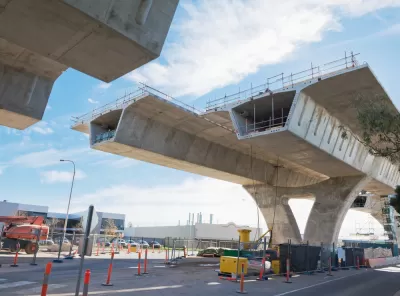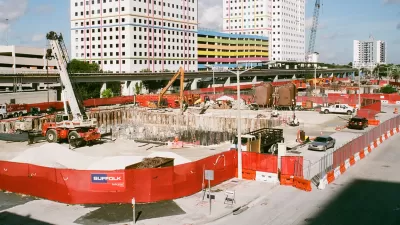The U.S. Department of Transportation has changed its rules in favor of local hiring: a pilot program will even encourage it. Minorities traditionally barred from high-paying construction work stand to benefit.

A recent Justice Department ruling has prompted the U.S. Department of Transportation to "change its own rules to permit local projects receiving federal assistance to use local preferences in hiring employees. At the same time, the department is launching a one-year 'hire local' pilot program to encourage transportation agencies to set up programs that give preference in hiring to local residents, low-income workers and veterans."
Not everyone is sold. Sandy Smith writes that the construction trade's union-centric culture has been slow to incorporate certain kinds of people. "One other obstacle the advocates said needed to be overcome is the reluctance of some in the construction trades to recognize the untapped value in this potential workforce. Some contractors and union officials worry that there won't be enough qualified candidates in low-income communities, for instance."
The rule change may begin to change that perception, garnering real benefits for minority communities: "construction remains one of a relative handful of fields that offer the opportunity for high-paying skilled work to those without college degrees."
The public has until May 6 to comment on the proposed change.
FULL STORY: DOT Rule Change Lets Transportation Dollars Stay in Local Communities

Study: Maui’s Plan to Convert Vacation Rentals to Long-Term Housing Could Cause Nearly $1 Billion Economic Loss
The plan would reduce visitor accommodation by 25,% resulting in 1,900 jobs lost.

North Texas Transit Leaders Tout Benefits of TOD for Growing Region
At a summit focused on transit-oriented development, policymakers discussed how North Texas’ expanded light rail system can serve as a tool for economic growth.

Why Should We Subsidize Public Transportation?
Many public transit agencies face financial stress due to rising costs, declining fare revenue, and declining subsidies. Transit advocates must provide a strong business case for increasing public transit funding.

How to Make US Trains Faster
Changes to boarding platforms and a switch to electric trains could improve U.S. passenger rail service without the added cost of high-speed rail.

Columbia’s Revitalized ‘Loop’ Is a Hub for Local Entrepreneurs
A focus on small businesses is helping a commercial corridor in Columbia, Missouri thrive.

Invasive Insect Threatens Minnesota’s Ash Forests
The Emerald Ash Borer is a rapidly spreading invasive pest threatening Minnesota’s ash trees, and homeowners are encouraged to plant diverse replacement species, avoid moving ash firewood, and monitor for signs of infestation.
Urban Design for Planners 1: Software Tools
This six-course series explores essential urban design concepts using open source software and equips planners with the tools they need to participate fully in the urban design process.
Planning for Universal Design
Learn the tools for implementing Universal Design in planning regulations.
Ascent Environmental
Borough of Carlisle
Institute for Housing and Urban Development Studies (IHS)
City of Grandview
Harvard GSD Executive Education
Toledo-Lucas County Plan Commissions
Salt Lake City
NYU Wagner Graduate School of Public Service



























